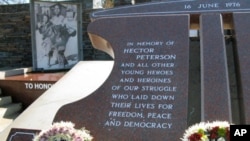U.S. first lady Michelle Obama arrives in South Africa to begin a week-long trip centered on messages of youth empowerment. The visit to Africa, without her husband President Barack Obama, will also take her to Botswana.
US First Lady addessed Africa's youth
Prior to embarking on her flight from the United States, Michelle Obama addressed a message to Africa's youth. "I am doing this because we know that Africa is a fundamental part of our interconnected world and when it comes to meeting the challenges of our times, whether it is climate change or extremism, poverty or disease, the world is looking to African nations as vital partners and will be looking across the continent to young people just like all of you to help lead the way," she started.
One of those awaiting Obama's brief stay in Johannesburg is 29-year-old Ivory Coast national Aminata Kane Kone, a dentist, mother of four, and activist for women's rights. She was selected to take part in the U.S.-sponsored Young African Women Leaders Forum coinciding with the first lady's visit.
Promoting youth engagement, education, health and wellness
Kone says it will be a great honor and opportunity to meet and listen to Obama.
Kone says the U.S. first lady has had a very inspirational journey that can encourage Africa's youth to make the change they want to see. Her own wishes, she said, were equal women's access to health, political power, education and business loans.
But many South Africans interviewed for this report seemed underwhelmed, and said they preferred to wait and see what Obama would do and say during her visit.
One of them was Zweli, a third-year university philosophy student. "It does not matter much. It does not change the price of beer, although I do not drink beer, I guess that is the phrase. Diplomatic politics is very show and tell, handshakes and kind gestures," Zweli said.
He says even though the Obama administration has called for more economic engagement with Africa, he feels it would be more important for the U.S. government to end subsidies to U.S. farmers so that more African farmers, such as rice and cotton growers, could once again make a living, and not face what he called unfair competition.
"These things of course are not addressed mostly because of the power hierarchy. The United States does not want to sign certain treaties and South Africa is not in a position to stand up against such inequalities within the global community," Zweli explained.
Trip goal includes improving relations between the U.S. and Africa
International analysts say the visit comes at a time when the United States is seeking to improve relations with Africa's major economic and political powers amid tensions over foreign policy. South Africa's President Jacob Zuma has called for the African Union to help facilitate a cease-fire in Libya, and for NATO to end its military campaign there.
President Obama has said not intervening in Libya to defend populations under attack from government forces would have been, in his words, a "betrayal" of what the United States stands for.
More recently, the youth wing of South Africa's ruling African National Congress accused the U.S. government and others of trying to impose a puppet government in Libya for more access to oil.
Most of the media headlines and discussions in public areas of Johannesburg revolved not around Obama's arrival, but around recent comments by the ruling party's youth leader, Julius Malema, stepping up demands for South Africa's nationalization of mines and banks, and what he called an un-led revolution to reclaim land, without payment, from white South African farmers.




